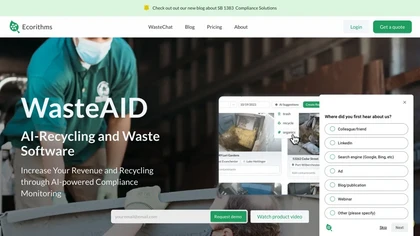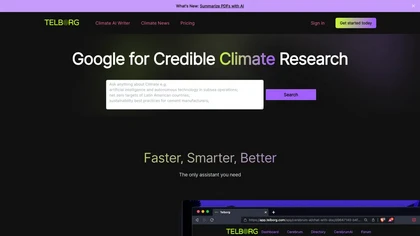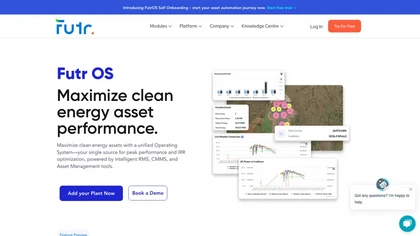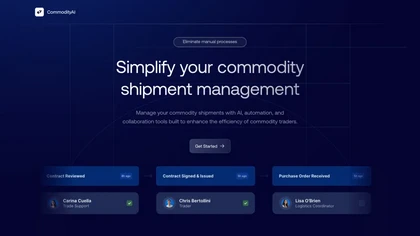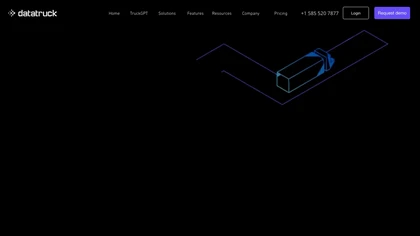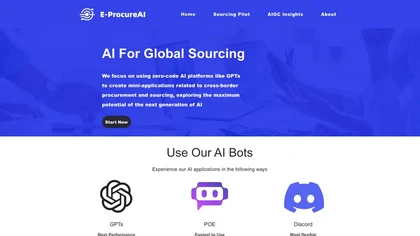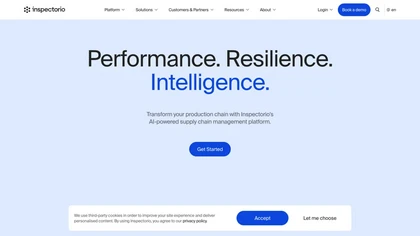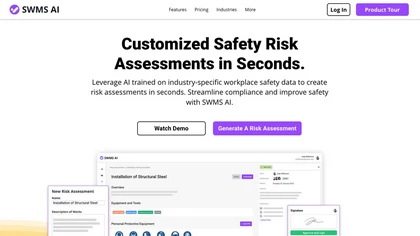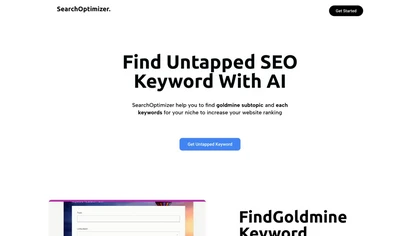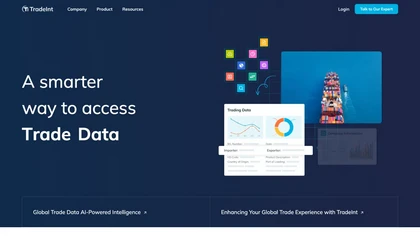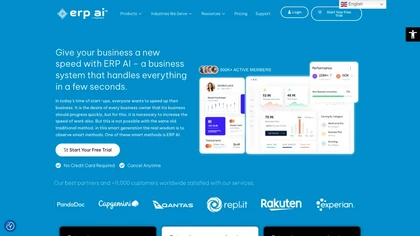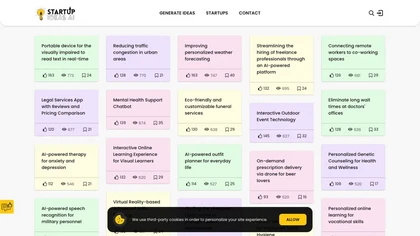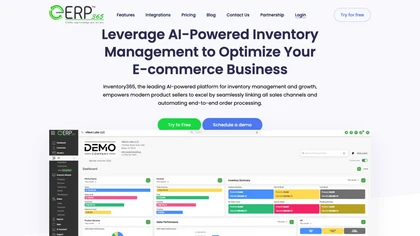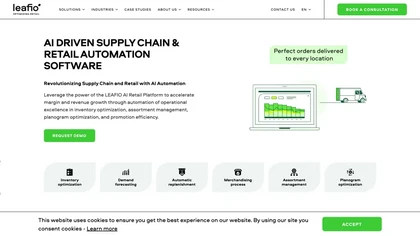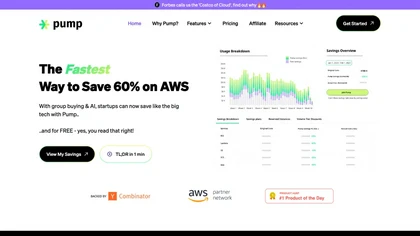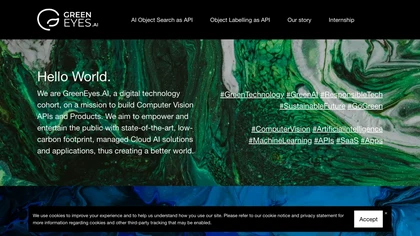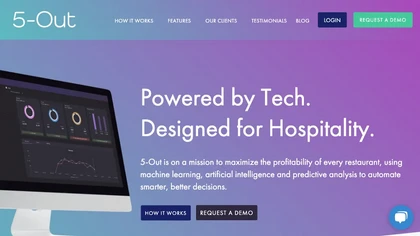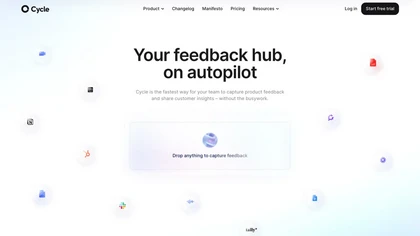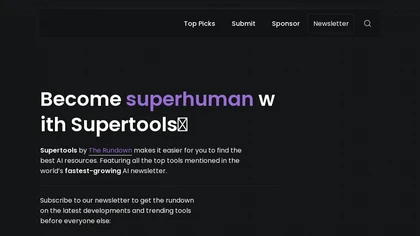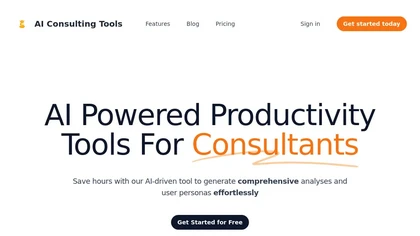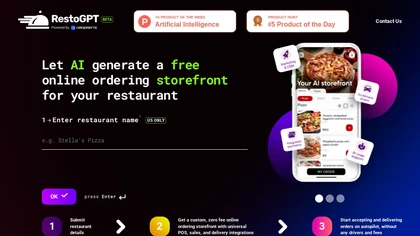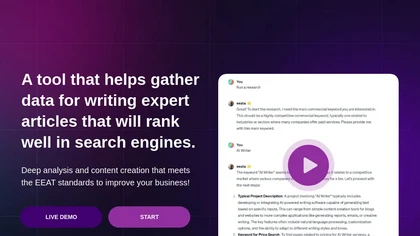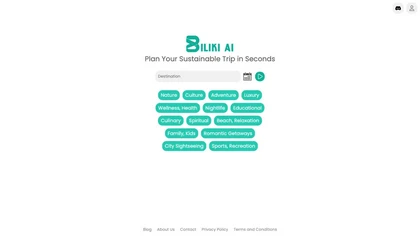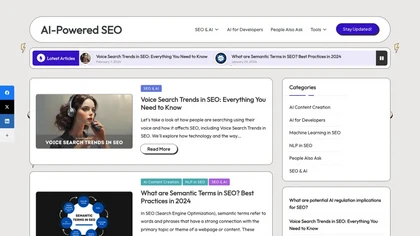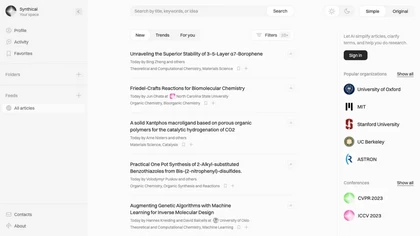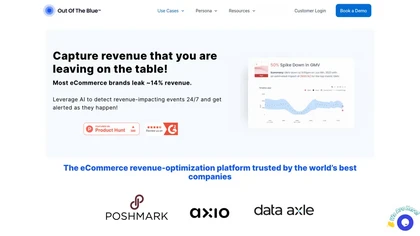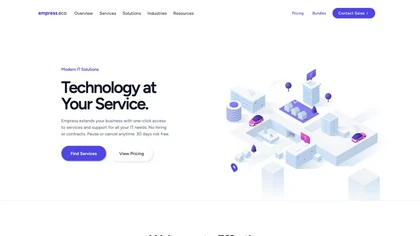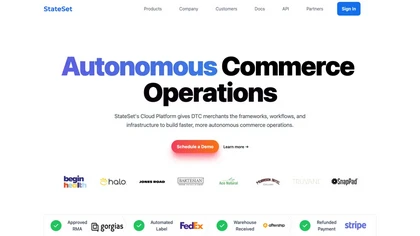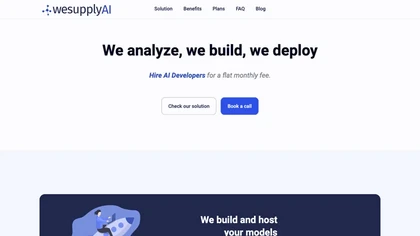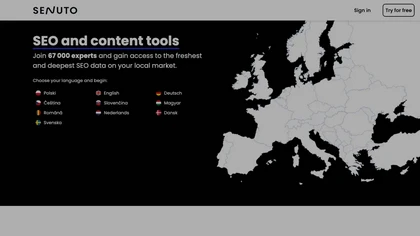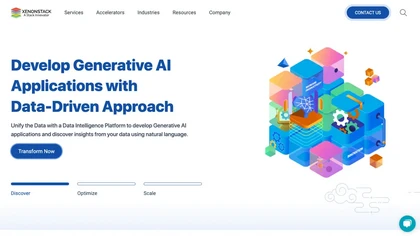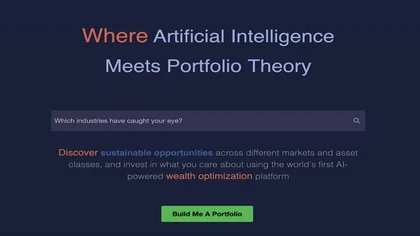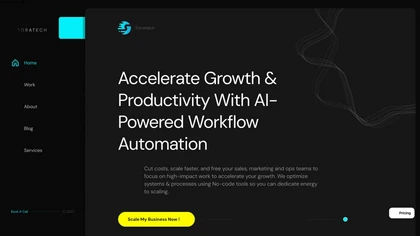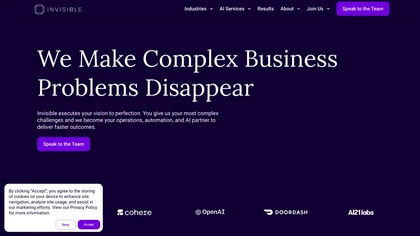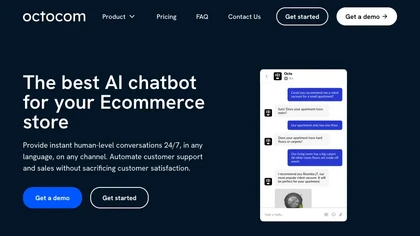AI use cases for Sustainability
Generative AI can be applied in various applications for sustainability. Here are some examples to explore below for inspiration with AI tools to get you started with using AI in sustainability.
🛠️ 70 AI tools for Sustainability
Explore a dynamic list of some of the most popular tools to get you started with various AI use cases and applications for Sustainability to streamline your workflows and productivity today.
WasteAID features
- Automatic route auditing
- Integration with existing systems
- Audit over 400k generators and 1m+ pickups
- Detect overflow incidents and identify contamination
- Tracking commercial account compliance
Reform features
- Modular building blocks for customized solutions
- State-of-the-art multimodal AI models for logistics documentation
- Automation of data capture for various documents
- Seamless integration with universal transportation management systems (TMS) through a universal API
- Embeddable customer dashboards for real-time data insights
Green Suggest features
- AI-powered upcycling suggestions
- Personalized upcycling ideas based on user preferences
- Vast database of relevant content and DIY tutorials
- Reduction of textile waste
- Promotion of eco-conscious fashion choices
Telborg features
- Summarization of PDFs
- Custom knowledge base for insightful answers
- Generation of fact-filled first drafts on climate topics
- Structured and accurate inputs for presentations and reports
- Blog section for staying informed on latest climate topics
FutrOS features
- Unified operating system
- Warranty management
- Digital twin technology
- Automated performance insights
- Real-time alerts
Unfig features
- Automated data capture from various logistics documents
- Universal TMS integrations for seamless connectivity
- Embeddable customer dashboards for real-time data insights
- Scraping information from numerous sources for visibility into logistics data
- Streamlining logistics operations with unprecedented speed and efficiency
Dairytech.ai features
- milkround automation
- automatic payment collection
- stock reconciliation
- online order management
- customer communication
🔥
Create your account, save tools & get personal recommendations
Receive a weekly digest of our handpicked top tools.
Unsubscribe anytime
CommodityAI features
- Automated shipment processes
- Auto-generated shipping nominations
- Real-time shipment tracking
- AI-driven performance analytics
- Smart data extraction
Datatruck features
- Automating manual processes
- Providing reporting analytics
- Offering actionable insights through AI/ML analytics
- Hyper automation capabilities
- Seamless data integration and real-time visibility
Reform features
- Modular building blocks for rapid customization
- Automated data extraction from various documents
- Seamless integration with universal TMS platforms
- Real-time visibility into logistics data
- Efficient data scraping from multiple sources
Greenifs.ai features
- Detect greenwashing errors
- Ensure compliance with green marketing guidelines
- Check social media content for compliance with region-specific regulations
- Offer targeted corrections and recommendations
- Help avoid legal issues related to environmental laws
E-Procure AI features
- Zero-code AI platform integration
- Recommendation of supply locations and suppliers
- Market expansion assistance
- Product opportunity identification
- Real-time exchange rate inquiries
Ever Efficient AI features
- Custom dashboard
- Recurring ideation
- Debugging and testing
- System monitoring
- Bi-weekly sprint-based development cycle
inspectorio.com features
- AI-powered supply chain management platform
- Utilization of innovative technologies like AI
- Digitizes and connects supply chain processes within a single tool
- Enables intelligent analysis of the entire ecosystem
- Reduces production chain risks through advanced analytics
Proxy features
- Energy-efficient upgrades
- Carbon footprint reduction
- Utility bill savings
- Tax credits and rebates
- Energy efficiency analytics
FolioProjects features
- AI project management assistant
- Data-rich dashboards for analysis
- Project portfolio management workflow
- Enterprise asset management life cycle support
- Predictive, prescriptive, and generative AI capabilities
SWMS AI features
- Tailored risk assessments generation
- Customizable safety policies
- Personalized document generation
- Integration of AI assistant for safety information
- Streamlining compliance processes
Topzeal features
- Product creation
- Sales amplification
- Marketing copy generation
- Full-link data asset deposition management
- Intelligent label classification management
Inventive features
- Streamline rfis, rfqs, security reviews, rfps
- Generate reliable answers with ai
- Reduce reliance on subject matter experts
- Save substantial time and effort
- Up-to-date content
SearchOptimizer features
- Keyword clustering
- Content idea generation
- Keyword categorization
- Improved search engine visibility
- Time-saving in keyword research
TradeInt features
- Comprehensive global trade solutions
- Access to import and export data from major trading economies
- Data-driven strategies development
- Identification of new market opportunities
- Global trade analytics
Faircado features
- Product search across multiple categories
- Integration into browsing experience
- Automatic search for pre-owned products
- Support for second-hand items
- Assistance in finding refurbished alternatives
Saara.io features
- Focus on solving common industry challenges
- Reduce operational costs
- Analyzing customer data for personalized offers and improved shopping experience
edu720 features
- AI-powered content
- Powerful analytics
- Nanolearning capabilities
- Mobile learning capabilities
- Support for various industries
LookBook features
- Sustainable outfits
- Tailored to individual tastes
- User-friendly interface
- Virtual models
- Step-by-step guidance
MEJ ERP AI features
- Intelligent automation
- Data-driven insights
- Real-time analytics
- Predictive forecasting
- Seamless integration capabilities
Startup Ideas AI features
- Wide array of startup ideas generation
- Streamlining of hiring freelance professionals
- Connecting remote workers with co-working spaces
- Suggestions for eco-friendly customizable funeral services
- Real-time text reading for the visually impaired
GeniePM features
- Product requirements
- User stories
- Use cases
Inventory365 features
- Real-Time Inventory Tracking
- Warehouse Management
- Multi-location Fulfillment
- AI-Powered Demand Prediction
- Seamless Integration
LEAFIO AI Retail features
- AI-driven supply chain and retail automation software
- Automation of inventory optimization, assortment management, planogram optimization, and promotion efficiency
- Features such as demand forecasting, automatic replenishment, and merchandising process optimization
- Caters to various industries including retail, grocery, convenience stores, pharmacies, liquor stores, etc.
- Comprehensive suite of AI-powered tools to streamline retail operations and drive profitable growth
GearChain features
- Real-time AI-powered inventory management
- No-code builder for customizing forms and generating barcode scans
- Blockchain technology for data integrity and transparency
- Role-based access control for security
- AI algorithms for auto-generating forms
Servcy features
- Consolidate data from multiple tools into one central location
- Aggregated inbox to view and respond to various communications in one place
- AI support to prioritize and respond to important messages promptly
- AI capabilities for storing and managing documents as well as answering questions
- Features for tracking payments, analyzing time, merging calendars, and providing planning insights
SeeTree_AI features
- Tree detection
- Crop protection
- Farming efficiency
- Yield optimization
- Data collection techniques
Pump features
- Automated AWS savings optimization
- AI-powered algorithms for cost-effective AWS strategies
- Maximum security with limited access to user data
- Group buying for collective discounts on AWS
- Invite-based admin control for multiple AWS accounts
nOps features
- Automated AWS cost allocation
- Chargebacks and showbacks management
- Resource tagging
- Cost optimization tasks automation
- Rightsizing resources with a single click
GreenEyes.AI features
- Object search API
- Object labeling API
- Fast and reliable image recognition technology
- Supports up to 80 object classes
- Scalability on demand
Cargo features
- Data visualization
- Data discovery
- Data integration
- Automated reporting
- Revops workflow
5-Out features
- Predicting sales
- Optimizing labor
- Optimizing purchasing
- Quick setup
- Getting started
Zuro features
- Generative AI solutions
- LLM technology
- Structured and unstructured data processing
- Predictive model creation
- End-to-end workflow integration
Deftship features
- Cloud-based logistics solution
- Automation features for creating rules based on conditions
- Carrier integration without coding
- Real-time freight quotes
- API functionality for limitless possibilities in shipping processes
Cycle 3.0 features
- Fast integrations
- Semantic search
- Auto generation of titles
- Syncing customer data
- Visualizing feedback
Mezzi features
- Personalized steps to save on capital gains taxes
- Reduce fund fees
- Optimize portfolio allocation through advanced calculators and AI-powered suggestions
- Compare performance and allocations across different accounts for easy rebalancing
- Ad-free platform prioritizing data privacy and security
Process AI features
- Workflow generation
- Manage due dates and timelines
- Assign tasks to team members
- Built-in approval processes
- Document analysis
e-States features
- Fundraising tool synchronization
- Management tool simplification
- Real estate portfolio transformation
- Cutting-edge solutions
- Secure transactions
SuperTools features
- Task management
- News updates
- Trend monitoring
- Ai tool categorization
- Productivity enhancement
ScrappyChef features
- Recipe generation
- Leftover ingredient conversion
- Subscription service
- Paid service
- Food waste reduction
AI consulting tools features
- Generate swot analyses
- Create user personas
- Automate analysis generation
- Offer support through a support team
RestoGPT features
- Create customized online ordering platform
- Seamless integration with pos systems, sales platforms, and delivery services
- Automated order management, sales, and deliveries
- Efficient online ordering experience for customers
- Simplify online ordering process
bardeen features
- Automation
- Manual workflow
- Ai
- Workflow management
- Process automation
Convictional features
- Streamline onboarding vendors
- Standardize product content for retailers
- Reduce merchandising tasks by up to 75%
- Automated vendor payouts through integrated systems like Stripe
- Supports a range of integration methods with major ecommerce platforms like Shopify and Magento 2
METANA features
- Reward points system
- Trading rewards and coupons
- Omni-channel solution deployment
- Web-3 token-based reward system
- Customer engagement enhancement
Biliki AI features
- Custom itineraries generation
- Sustainable travel plans
AI-Powered SEO features
- Advanced Personalization
- Contextual Understanding
- Intelligent Recommendations and Suggestions
- Enhanced Search Efficiency
- Comprehensive Data Sources
Synthical: Science features
- Simple searches and filters
- Organic chemistry reactions exploration
- Inverse molecular design using genetic algorithms and machine learning
- Investigation of sustainable water disinfection technologies
- Delving into photochemical reactions and solid electrolyte interphase investigations
AI-Powered Innovation Toolkit features
- AI-powered tools
- Free online sessions and demos
- Innovativeness score calculation
- Articles on key innovation concepts, models, and tools
- Comprehensive suite of tools for fostering creativity and efficiency
Out Of The Blue features
- Real-time revenue-impacting event detection
- Identification of revenue leaks and issues
- Detection of revenue-impacting infra errors and user engagement/navigation issues
- Transition from manual monitoring to AI-driven proactive approach
- Optimizing ad spends and customer communication
empress.eco features
- AI-powered automation
- On-demand outsourcing solutions
- Software integrations
- Helpdesk services
- Industry-specific solutions
stateset.io features
- AI-powered automation features
- Simplifies tasks like customer support, logistics, shipping, and returns management
- Automating processes like order cancellations, subscription changes, and refunds
- Facilitates event-driven workflows and intercompany collaborations
- Powerful API, reliable infrastructure, and developer-friendly environment
Skipped features
- Collaborative fulfillment platform
- Enables selling out-of-stock product variants
- Real-time e-commerce network
- Capturing sale opportunities easily
- Sharing of margins within merchant network
wesupplyAI features
- AI model analysis
- AI model building
- AI model deployment
- Dataset uploading to secure cloud environment
- Integration of personalized APIs
Gensbot
5Gensbot features
- Instant creation of personalized goods
- Generation of customized catalog based on user preferences
- Sustainability focus in AI designs
- Local production to minimize carbon emissions
- Token rewards system for unlocking future designs and exclusive offers
Senuto features
- Keyword research tool
- Backlink analysis
- Content optimization suggestions
- Competitor analysis
- SEO performance tracking
- Content writing
XenonStack features
- Custom software development
- Platform engineering
- Enterprise DevOps
- Data warehouse management
- IoT integration
Covonyx features
- Estimates e-commerce shipping and fulfillment arrival dates
- Determines end users' zip codes for precise location detection
- Estimates tax rate in the cart based on user's location
- Provides API for developers to customize shipping estimates
- Enables fulfillment prioritization based on business days, holidays, warehouse locations, and product inventory
Typo features
- Measure effort and cost spent on innovation
- Technical debt
- Roadmap
- Identify sdlc metrics that impact development efficiency
- Remove blockers in real-time
Soratech features
- AI-powered workflow automation
- No-code tools utilization
- Access to top-tier experts
- Fixed monthly subscription model
- Focus on automation solutions for various business functions
Invisible Technologies Inc. features
- Wide array of operational needs tackling
- Real-time flexibility and integration with existing systems
- Achieving 8x ROI within 30 days for SKU enrichment
- GPT-4 integration
- Tailored AI solutions for multiple industries
Octocom
4.8Octocom features
- Product recommendations
- Upsell
- Handles 90% of support tickets
- Increases sales
- Improves customer experience
